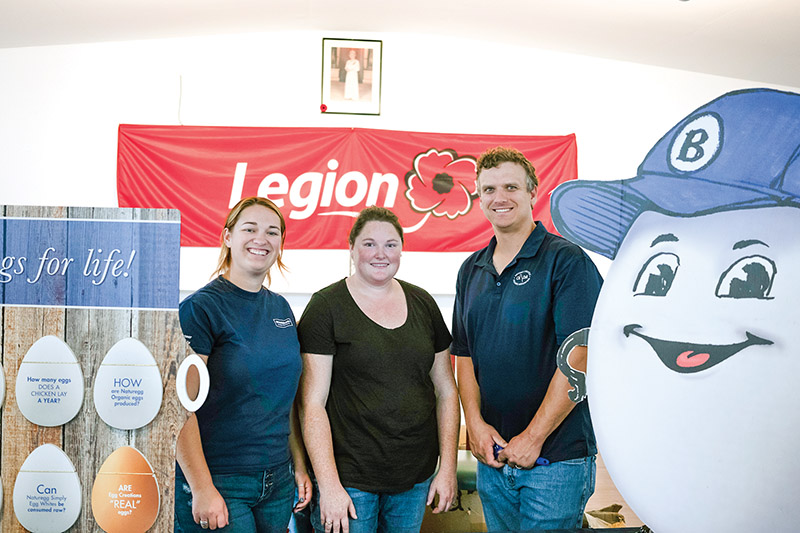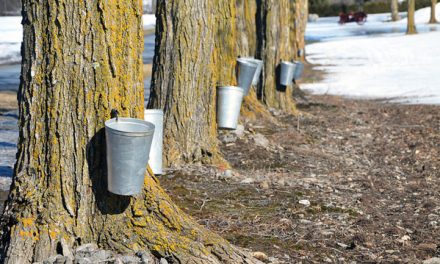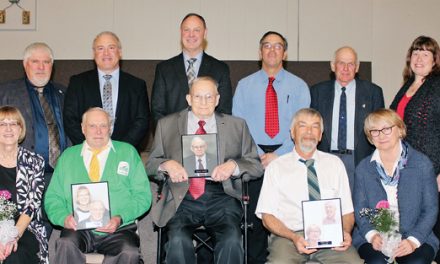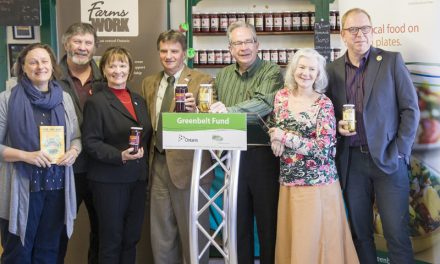Burnbrae was one of the sponsors of Mallorytown’s AgriCulture: Beyond the Business of Farming and were on hand to answer any questions and offer suggestions to anyone who took the time to stop by. In attendance were Logan Patterson, Jessica Reid, and Graham Dixon. Tinkess Photo
By Terry Tinkess
AgriNews Staff Writer
MALLORYTOWN – It is hard to argue that to be successful in any for profit activity you must treat it as a serious business. The farming aspect of agriculture though, is so much more than that. Certainly, it is a business, but it is a lifestyle, it is a family activity, it is an intergenerational activity, and it speaks of heritage and respecting where we came from to better understand where we are.
Many people not involved in farming don’t really understand that. How many children, if asked “Where does your food come from?” would answer “The grocery store.”
That is why events like Mallorytown’s “Beyond the Business of Farming” is so important. If it doesn’t necessarily build a connection to agriculture, it at least provides a glimpse into this industry that, to some extent, impacts everyone.
Billed as a family event, the day started off with a breakfast that was served from 8:00 a.m. until noon inside the Legion. Activities and educational events began at 10:00 a.m. and ran until 2:30 p.m.
There was a lot to choose from, both inside and out. There was live music, assorted local vendors selling their products, crafts, a bouncy play area, information booths and live animals, with a one-day old calf, getting a lot of attention.
Alexandra Veenstra, almost two, and his mom Erin had stopped by on their way to a family event and Alex was captivated by the calf. “It’s my cousin’s birthday,” said Erin, “And we’re from Gananoque, so we just came to check out the fair and this is the best one I’ve been to so far this year. We went to the Lyndhurst Turkey fair, but it was just so many vendors. There were no real animals or anything. This is probably the best so far.”
Neil Modler is the owner of the calf. His farm has between 175 and 200 head of cattle and they also have a small beef herd of about 20-25. They supply several local businesses. Neil was acting in a supervisory capacity while his grandson Mike was caring for the calf and answering questions.
The Modler farm is a perfect example of a family farm as it has been in the family for seven or eight generations, and 187 years. It appears that number will continue to rise.
Roger Haley is the mayor of Front of Yonge, which includes Mallorytown, and he is also one of the team’s organizing the event.
This is a third time we had this and it’s just to celebrate agriculture,” said Haley. “And thank the people who feed us. I mean, that’s what it’s all about. Without the farming community who wouldn’t be fed and its great neighbours to have.”
Haley was part of a group that got together several years ago to lobby the government for changes to regulations that would better allow them to control the coyote population and their effect on livestock. The group stayed together, which gave Haley an idea.
“I said let’s put something on for the farming community and spend a couple hours letting people see what you know,” said Haley. “A lot of these people don’t know what happens in a farm, right? They’ve never seen a calf up close or know how food ends up in the grocery store. And that’s exactly where to come from. So, people get to learn that stuff. and talk to folks. That’s important. Especially for the little ones. little things for the kids here, things like pumpkin painting and face painting and milk the cow, you know Maple’s here, you can milk the cow. Next year, if we have enough room, we’re going to have pony rides. So that’s what it’s all about just celebrating agriculture and saying thank you.”
4-H has a strong presence in Eastern Ontario and Brenda Dunster is one of the many volunteers who helps keep it that way. “It’s pretty good. Yeah, pretty good. We do a lot of life skills and livestock and then I do Cloverbuds, which is your six, eight-year old’s. The 4-H year is just winding down, but we’re always looking for new members.
Dunster says that in her opinion any young person could benefit from what 4-H has to offer.
They can get a lot of life skills and life skills will carry them on through their whole life. It’s a great program and they can do anything from showing livestock to baking bread and baking cookies and gardening and cooking. Cooking seems to be very popular. All the members we have all like to hear about the cooking.
Inside the Legion building is where most of the information booths were located. There were representatives from the Ontario Federation of Agriculture (OFA), Leeds County Federation of Agriculture, Burnbrae Farms, Maple Syrup Producers Association, Ontario Sheep Farmers and more.
Ruth Vogel, the OFA representative was asked how important she feels events like this are.
“Oh, very important,” said Vogel. “Because, you know, the further the kids get away from the farm, they don’t understand where their food comes from. I’ve heard the refrain so many times, “Oh, my food comes from the grocery store. They don’t realize food comes from a farm and all the work that is involved.”
George Horton is a representative of the Maple Syrup Producers Association, and he was hoping to speak with interested parties about how in Ontario there is still a lot of growth potential.
“We’re hoping to grow it in this area,” said Horton. It’s a big job but there’s so much potential. Everybody wants a healthy product these days. Maple syrup compared to other types of sugars is, very healthy to use, a lot of people are looking for that. One example is I sell to a local health clinic. They do physiotherapy, and when she first approached me, I thought, we’ll sell maybe a little bit. Well, I sell a ton of maple syrup to that place, because I think they get them, they say, oh, this a healthy alternative, and I want to be healthy. I sell a lot of maple syrup to grocery stores now. And some of the local restaurants are starting to use it for cooking. And I picked up four different places in the last year because they would rather cook with maple syrup than other types of sugar. Not only for the health benefits, but also the tastes.”
Revenue streams, wellness programs, complimentary products, all terms that you wouldn’t have heard much around farming in the past, but now they are commonplace. Farming has become more business focused, and will continue to do so in the future with technology like autonomous implements. Despite all this, farming is still much more than a business, and it is through events like this that the public can get a better idea about where the food they enjoy so much comes from.













